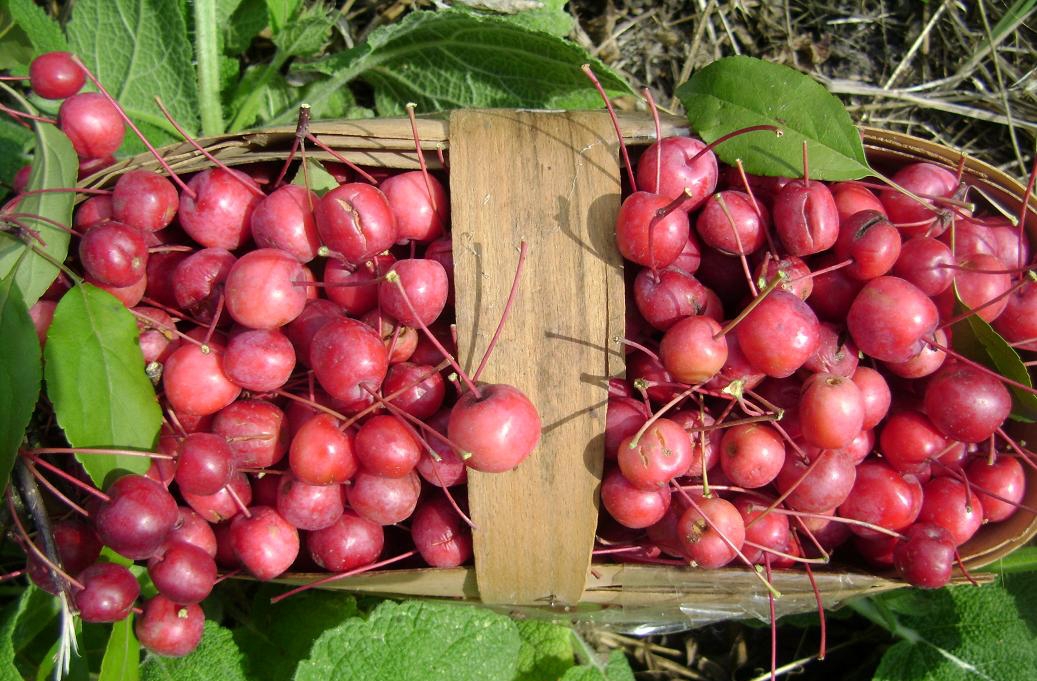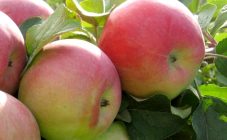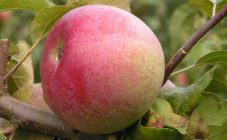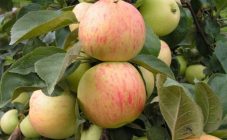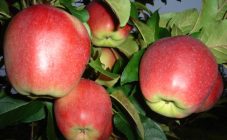Content:
The Paradise apple variety is very popular among both novice amateur gardeners and experienced breeders. Small, compact trees with variegated abundant flowering and a generous harvest of poured apples are a real decoration of the garden and an ideal option for owners of a small plot.
According to The Plant List, a variety of hybrid origin called Malus + prunifolia.
The All-Russian Institute of Selection and Technology of Horticulture and Nursery has studied and bred hundreds of Raika apple trees of various shapes and varieties.
Varieties and characteristics of varieties
Translated from Latin, the variety "Paradisiana" means "Paradise apple".
Regions with a mild warm climate are suitable for the cultivation of paradise apples. In a harsh climate, only cloned varieties with frost-resistant qualities can be grown.
The main varieties of the variety are:
- Golden Chinese (with early ripening of fruits). A low tree with a sparse crown, ovaries with fruits are located at the ends of branches. The fruits are juicy, tasty, with a rich aroma. However, they are not suitable for long-term storage;
- Kitayka Kerr is a frost-resistant, low, compact tree with a non-thickened crown and late ripening of fruits. Apples are bright burgundy with excellent exotic taste characteristics. In a refrigerated chamber, fruits retain their taste until winter;
- Bagryanka Sibirskaya is a frost-resistant late variety with a compact crown. Differs in a particularly generous harvest of bright aromatic fruits with a special tart taste;
- Ranetki is the result of crossing Bagryanka and Kitayka varieties. Fruiting occurs 3 years after planting and proper care. Apples have a different color: from pale pink to red-purple. The taste is spicy, sourish-tart;
- Altai dove is a medium-sized tree with golden flattened fruits covered with an unnatural bluish bloom. Pronounced apple aroma with sweet and sour taste;
- Autumn joy is a frost-resistant variety with late ripening of fruits. Apples, weighing up to 50 grams, are flattened with a weak ribbing. The pulp is white with an excellent sweet and sour taste. In a cellar, the shelf life is increased to 3 months.
The description of the variety, growing conditions and climate requirements, the timing of fruit ripening, and the rate of fruiting will help to choose the most optimal apple variety Paradise apple. A large selection with early (September), medium (October-November) and late (with the first frost) ripening and high yields will help to grow a healthy tree in any area, regardless of climatic conditions.
Planting and leaving
Planting trees should be carried out in the spring (in harsh climatic conditions with a late ripening of fruits) and in autumn for regions with a mild climate.
For planting, trees with a well-developed root system and branches are suitable. The trunk should be solid, with a clearly pronounced place of the pinning (inoculation) and developed kidneys (during visual inspection, the kidneys should not be dry).
The plant is planted in fertile soil. A handful of wood ash, humus must be added to the dug hole. After planting, the young tree is tied to a stem (support) and thoroughly watered with water. Then the earth is tamped and mulched.Every year in the spring, humus and a complex of mineral fertilizers are introduced into the soil.
The variety is self-pollinated and does not need additional pollination. Abundant flowering with a pronounced aroma attracts bees to the garden, which contributes to the pollination of other crops.
Timely and competent tree care promotes good development and abundant fruiting. Care consists in:
- Regular annual pruning. With a sharp pruner or a special file, it is necessary to remove dry, thickened crowns or excessively long branches by 20-30 cm;
- Moderate watering, loosening the near-stem zone and regular dressing;
- Preventive treatment of the stem of the stem with Bordeaux liquid, lime or chalk solution;
- Bending branches and installing supports with abundant fruiting to avoid breaking off branches;
- Wrapping (fencing) the tree trunk with moisture-permeable material to prevent damage to the young bark by rodents and pests.
Disease and pest resistance
In general, the variety is resistant to diseases such as powdery mildew, scab, powdery spot of fruits, and aphids.
For the prevention of diseases, it is necessary to treat the trunks in a timely manner with disinfectant solutions.
Collection and storage
Harvesting is recommended early in the morning in dry, clear weather. Apples collected with a stalk are laid out on a flat ventilated surface under a canopy for 6-8 hours, and then put into a cellar or refrigerator (for early-ripening varieties).
With proper maintenance of storage conditions, the fruits of the late Rai apple tree can be stored for up to 3 months. However, during long-term storage, slight deformation and the appearance of wrinkling of the fruit are allowed, due to a decrease in moisture in it.
Advantages of the variety
Gardeners distinguish several main advantages of the Raiki variety:
- Abundant harvest, regardless of the variety;
- Disease resistance;
- Frost resistance;
- Drought resistance;
- Self-pollination.
Beneficial features
Despite the miniature size of the fruit, they contain a large amount of vitamins and minerals. Regular consumption of heavenly apples contributes to:
- Improving digestion and normalizing bowel function,
- Normalization of blood pressure, purification of blood from cholesterol, toxins, excess fluid,
- Strengthening the walls of blood vessels, preventing the development of atherosclerotic plaques,
- Strengthening and enhancing immunity.
The fragrant fruit Paradise apple with a delicate juicy pulp and sweet and sour taste has long earned respect both among experienced gardeners and novice amateurs. Just a few trees in the garden ensure a beautiful blooming apple orchard and a bountiful harvest for the whole family. Simple agro-technological measures contribute to long-term fruiting and high-quality harvest.


